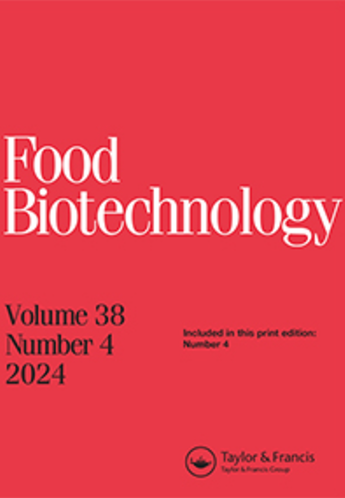Critical F129 and L138 in loop III of bile salt hydrolase (BSH) in Lactobacillus plantarum B14 are essential for the catalytic activity and substrate specificity
IF 1.6
4区 农林科学
Q4 BIOTECHNOLOGY & APPLIED MICROBIOLOGY
引用次数: 0
Abstract
ABSTRACT Bile salt hydrolase (BSH) is a gut-bacterial enzyme that influences human health by altering the host fat digestion and cellular energy generation. BSH is essential for deconjugation of the glycine or taurine-conjugated bile salts in the small intestine of humans. Therefore, BSH may be a key microbiome target for the designing of new measures to control some diseases in humans. BSHs, a member of the N-terminal nucleophile (Ntn) hydrolase superfamily, exhibit higher variation in substrate specificity. The phenylalanine-129 (F129) and leucine-138 (L138) in loop III of BSH, thought to be responsible for substrate specificity, are partially conserved in this superfamily. In this study, the aromatic-hydrophobic F129 and aliphatic-hydrophobic L138 of C-terminally His-tagged BSH from Lactobacillus plantarum B14 (LbBSH) was substituted for aliphatic-hydrophobic isoleucine (I) and negatively charged polar glutamate (E) amino acid, respectively, by site-directed mutagenesis and characterized using an Escherichia coli BLR(DE3) expression system. Although both mutations resulted in an assembled and stable recombinant BSHs (rBSHs), they altered the catalytic activity and substrate specificity of rBSH. This is the first experimental finding which confirmed that F129 and L138 were critical amino acids for the catalytic activity and substrate specificity turnover of BSH.植物乳杆菌B14中胆盐水解酶(BSH)环III中的关键F129和L138对催化活性和底物特异性至关重要
胆汁盐水解酶(BSH)是一种肠道细菌酶,通过改变宿主脂肪消化和细胞能量生成来影响人体健康。BSH对于人体小肠中甘氨酸或牛磺酸结合的胆盐的解偶联是必不可少的。因此,BSH可能是设计控制人类某些疾病的新措施的关键微生物组靶点。BSHs是n端亲核酶(Ntn)水解酶超家族的成员,在底物特异性方面表现出更高的变化。BSH III环中的苯丙氨酸-129 (F129)和亮氨酸-138 (L138)被认为负责底物特异性,在该超家族中部分保守。本研究采用定点诱变的方法,将植物乳杆菌B14 (LbBSH)中c端hs标记的BSH的芳香型疏水F129和脂肪型疏水L138分别替换为脂肪型疏水异亮氨酸(I)和带负电荷的极性谷氨酸(E)氨基酸,并利用大肠杆菌BLR(DE3)表达系统对其进行了表征。虽然这两种突变都产生了组装和稳定的重组bsh (rBSHs),但它们改变了rBSH的催化活性和底物特异性。这是首次证实F129和L138是BSH催化活性和底物特异性转换的关键氨基酸的实验发现。
本文章由计算机程序翻译,如有差异,请以英文原文为准。
求助全文
约1分钟内获得全文
求助全文
来源期刊

Food Biotechnology
工程技术-生物工程与应用微生物
CiteScore
3.80
自引率
0.00%
发文量
15
审稿时长
>12 weeks
期刊介绍:
Food Biotechnology is an international, peer-reviewed journal that is focused on current and emerging developments and applications of modern genetics, enzymatic, metabolic and systems-based biochemical processes in food and food-related biological systems. The goal is to help produce and improve foods, food ingredients, and functional foods at the processing stage and beyond agricultural production.
Other areas of strong interest are microbial and fermentation-based metabolic processing to improve foods, food microbiomes for health, metabolic basis for food ingredients with health benefits, molecular and metabolic approaches to functional foods, and biochemical processes for food waste remediation. In addition, articles addressing the topics of modern molecular, metabolic and biochemical approaches to improving food safety and quality are also published.
Researchers in agriculture, food science and nutrition, including food and biotechnology consultants around the world will benefit from the research published in Food Biotechnology. The published research and reviews can be utilized to further educational and research programs and may also be applied to food quality and value added processing challenges, which are continuously evolving and expanding based upon the peer reviewed research conducted and published in the journal.
 求助内容:
求助内容: 应助结果提醒方式:
应助结果提醒方式:


